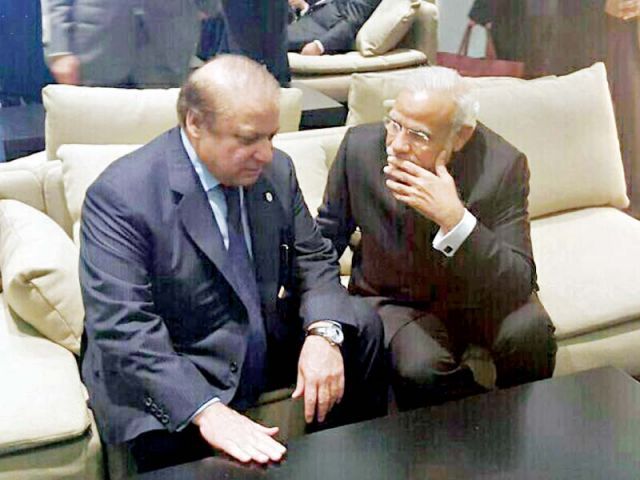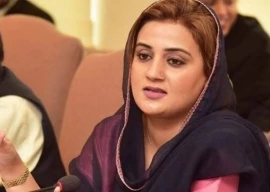
It was certainly not the ‘chance’ meeting in full public glare between Pakistan’s Prime Minister Nawaz Sharif and his Indian counterpart Narendra Modi on the sidelines of the climate talks in Paris on November 30 that had paved the way, first for the top secret Bangkok talks between the national security advisers of the two countries on December 6 and then the surprise foreign ministers’ level bilateral talks on the sidelines of the Heart of Asia conference in Islamabad on December 9.
In retrospect, the sidewalk-like encounter in Paris appears more like a contrived event stage-managed by powerful international players to provide a plausible setting for the subsequent events that culminated in Islamabad with the release of a joint statement which, while heralding resumption of bilateral peace talks, had emphatically focused on terrorism with Pakistan assuring India of ‘the early conclusion of the Mumbai trial.’
Kashmiri leaders hail Pak-India talks
The fast-paced 10-day developments leading to December 9 meeting between Indian External Affairs Minister Sushma Swaraj and Pakistan Prime Minister’s Adviser on Foreign Affairs Sartaj Aziz owe it all to the two-month long, painstaking work of concerned parties that was set in motion with the visit of Prime Minister Nawaz Sharif and ISI chief General Rizwan Akhtar to the US in October followed by the visit of Chief of the Army Staff General Raheel Sharif in November.
Fearing eruption of an unintentional war between the two South Asian neighbours with a terrorism-haunted India on the one side and on the other a Pakistan under intense pressure from continued violations of the LoC and the working boundary, the US is understood to have used these visits to offer to help -- if Pakistan was willing to reciprocate by agreeing to resume the stalled talks with India on terrorism. Pakistan, for understandable reasons, readily agreed.
India, on its part, had needed no convincing to reverse its policy directions with regard to Pakistan once it was promised that terrorism would be the foremost topic to be discussed at the bilateral level.
Pakistan, India sound upbeat ahead of talks
Meanwhile, the nationwide backlash in reaction to BJP’s anti-Muslim, anti-Pakistan and militant Hindutva policies seemingly had rendered the Modi government in the right frame of mind to respond positively to Washington’s advice to return to the negotiating table.
So the Ufa promise Pakistan had refused to honour earlier because India had objected to Prime Minister’s Adviser Sartaj Aziz meeting the Hurriyat leaders in New Delhi prior to the talks on terrorism, was finally honoured in Islamabad because the deal on terrorism had already been clinched between our new NSA Lt-Gen Nasir Janjua (retired) and his Indian counterpart Ajit Doval in Bangkok where Hurriyat did not travel on the appointed day.
So seven years after the Mumbai terror attacks, India and Pakistan agreed to resume their structured dialogue for peace. To be called comprehensive bilateral dialogue, the new platform would include, besides the eight issues contained in the now defunct composite dialogue, humanitarian issues like people-to-people exchanges and religious tourism. The foreign secretaries of the two countries would be formulating a timetable for secretary-level talks on all the 10 issues that form the resurrected dialogue process.
Headway has already been made on all the eight topics contained in the defunct composite dialogue, including on Kashmir with even the Hurriyat leadership endorsing the four-step formula of Musharraf. So, it would only be logical to expect New Delhi and Islamabad to resume the exercise under the comprehensive bilateral dialogue from where they had left off the composite dialogue rather than trying to reinvent the wheel.
Published in The Express Tribune, December 11th, 2015.

1722421515-0/BeFunky-collage-(19)1722421515-0-165x106.webp)



1732103737-0/Copy-of-Untitled-(55)1732103737-0-270x192.webp)


1726722687-0/Express-Tribune-Web-(9)1726722687-0-270x192.webp)








COMMENTS (6)
Comments are moderated and generally will be posted if they are on-topic and not abusive.
For more information, please see our Comments FAQ